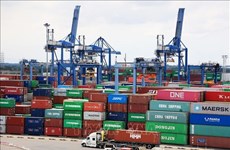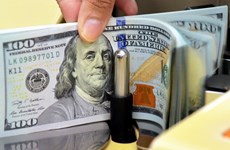Deputy PM welcomes more FDI
Vietnam welcomed the participation of foreign enterprises in the
country's reform agenda, said Deputy Prime Minister Hoang Trung Hai.
Vietnam welcomed the participation of foreign enterprises in the
country's reform agenda, said Deputy Prime Minister Hoang Trung Hai.
Hai was speaking at an international summit on investing in Vietnam, held by the Ministry of Foreign Affairs and the Economist Group Conference in Hanoi yesterday.
He said foreign investment will help reduce the trade deficit.
"When joining the Vietnam market, all enterprises are seen as a part of the Vietnamese economy. We are willing to create the most favourable conditions for investors," Hai said.
The Deputy Prime Minister pointed out that investing in Vietnam opened the doors to a market of nearly 90 million people, and potentially a further 600 million consumers in the ASEAN region.
"I know that all of you have gone through a hard time, but I believe when you come to Vietnam you will get more investment opportunities," Hai said.
The Government's planned reform agenda will focus on stabilising the macroeconomy, he said.
"Growth targets are not a top priority but we still have to pay attention to growth since it affects employment. Stabilising the macro economy will help enterprises plan for the future."
Hai said State-owned enterprises (SOEs) are being restructured to be as competitive as possible, and pledged to fight corruption and to reform the legal framework so as to create a more competitive environment.
He added that the Government is working on creating an independent central bank from the State Bank of Vietnam.
"We will collect opinions from relevant sectors on the advantages and disadvantages, especially on its role and how independent it will be," Hai said.
Deputy Minister of Planning and Investment Cao Viet Sinh said that mobilisation of resources for the infrastructure sector is welcomed in Vietnam.
"The Government is going to create opportunities for investors to be engaged in infrastructure sectors, especially large-scaled infrastructure projects," Sinh said.
The Government will also work more with the private sector in activities such as providing land and improving the commercial viability of projects.
"It will also be in charge of revising the appropriate policies for raising revenues for transport infrastructure," Sinh said.
"We hope in the coming time, investors will continue to put their trust in us and we will provide better policies to make sure that they will continue their stay here."
CEO of Investment group Tan Tao, Dang Thi Hoang Yen, said the Government completely understands what have changed in the economy.
Yen said private companies are responsible for nearly 50 percent of the country's GDP, and raised the question why they are not allowed to enjoy fair treatment now that foreign-invested enterprises contributed 29 percent to GDP while State-owned businesses contributed only 27 percent.
Stuart Dean, CEO of General Electrics (GE) ASEAN said the Government's policies and regulations are right; the problem is in their implementation.
The summit attracted academics and senior executives from Government, domestic and regional businesses./.
Hai was speaking at an international summit on investing in Vietnam, held by the Ministry of Foreign Affairs and the Economist Group Conference in Hanoi yesterday.
He said foreign investment will help reduce the trade deficit.
"When joining the Vietnam market, all enterprises are seen as a part of the Vietnamese economy. We are willing to create the most favourable conditions for investors," Hai said.
The Deputy Prime Minister pointed out that investing in Vietnam opened the doors to a market of nearly 90 million people, and potentially a further 600 million consumers in the ASEAN region.
"I know that all of you have gone through a hard time, but I believe when you come to Vietnam you will get more investment opportunities," Hai said.
The Government's planned reform agenda will focus on stabilising the macroeconomy, he said.
"Growth targets are not a top priority but we still have to pay attention to growth since it affects employment. Stabilising the macro economy will help enterprises plan for the future."
Hai said State-owned enterprises (SOEs) are being restructured to be as competitive as possible, and pledged to fight corruption and to reform the legal framework so as to create a more competitive environment.
He added that the Government is working on creating an independent central bank from the State Bank of Vietnam.
"We will collect opinions from relevant sectors on the advantages and disadvantages, especially on its role and how independent it will be," Hai said.
Deputy Minister of Planning and Investment Cao Viet Sinh said that mobilisation of resources for the infrastructure sector is welcomed in Vietnam.
"The Government is going to create opportunities for investors to be engaged in infrastructure sectors, especially large-scaled infrastructure projects," Sinh said.
The Government will also work more with the private sector in activities such as providing land and improving the commercial viability of projects.
"It will also be in charge of revising the appropriate policies for raising revenues for transport infrastructure," Sinh said.
"We hope in the coming time, investors will continue to put their trust in us and we will provide better policies to make sure that they will continue their stay here."
CEO of Investment group Tan Tao, Dang Thi Hoang Yen, said the Government completely understands what have changed in the economy.
Yen said private companies are responsible for nearly 50 percent of the country's GDP, and raised the question why they are not allowed to enjoy fair treatment now that foreign-invested enterprises contributed 29 percent to GDP while State-owned businesses contributed only 27 percent.
Stuart Dean, CEO of General Electrics (GE) ASEAN said the Government's policies and regulations are right; the problem is in their implementation.
The summit attracted academics and senior executives from Government, domestic and regional businesses./.













